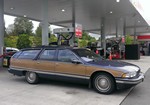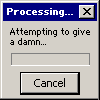| | My transmission is back in the car |  |
|
|
| Author | Message |
|---|
v8440
Posts : 16
Join date : 2016-11-07
 |  Subject: My transmission is back in the car Subject: My transmission is back in the car  Wed Dec 14, 2016 11:51 pm Wed Dec 14, 2016 11:51 pm | |
| My 4L60E lacked 2nd and 4th gear. I pulled it and had a guy rebuild it. It's back in the car now, and it appears to work perfectly. What shocked me is when I floored the car from a standstill. It lit the rear tires up all the way through 1st gear and fishtailed a bit, only ceasing to spin both rear tires when it shifted into second. I don't normally drive like that at all, but I wanted to test it under duress for slippage. Is this level of torque normal for these cars? The only thing done to mine is that a previous owner put a smooth air inlet pipe on with a pleated gauze-type filter on the end. That, and I did have him put a one step higher stall speed converter in it. It's a dacco converter, and I believe he said it's rated for 1400-1600 rpm, or maybe just 1600? It's not noticeably loose at all, but maybe not quite as tight as the old converter. Anyway, it's not like the car has a bunch of gear-it's a tow package car with the 2.93's and limited slip. | |
|
  | |
Fred Kiehl

Posts : 7291
Join date : 2009-11-13
Age : 76
Location : Largo, FL 33774
 |  Subject: Re: My transmission is back in the car Subject: Re: My transmission is back in the car  Thu Dec 15, 2016 7:27 pm Thu Dec 15, 2016 7:27 pm | |
| Once you break the tires loose, they are relatively easy to keep spinning. The torque converter is the most likely change that would cause the difference. The engine gets into a higher spot on the torque curve before power is applied to the drivetrain. I believe the OEM TC is about 1600 RPM stall, and the next step up is probably 2400-2600 RPM.
I have a 24-2600 RPM stall behind the 454 in my OCC, and it acts just like any other car until it hits the stall, albeit it does not feel like a 4400 lb. car when driving normally. | |
|
  | |
lamune

Posts : 868
Join date : 2014-05-09
Location : Seattle
 |  Subject: Re: My transmission is back in the car Subject: Re: My transmission is back in the car  Thu Dec 15, 2016 9:07 pm Thu Dec 15, 2016 9:07 pm | |
| Just FYI, I have a Consolidated BU37W sitting here which is listed as a stock replacement for my car, the catalog shows it has a 1397 RPM stall speed. | |
|
  | |
v8440
Posts : 16
Join date : 2016-11-07
 |  Subject: Re: My transmission is back in the car Subject: Re: My transmission is back in the car  Thu Dec 15, 2016 9:07 pm Thu Dec 15, 2016 9:07 pm | |
| There are at least a couple of levels of stock stall speed between the OEM converter in my wagon and 2400. Mine is about 200 rpm above OEM for the car. I don't know how much difference the converter made, but it was unexpected for that much wheel spin from an essentially stock engine in a car that heavy with that much rear overhang and only 2.93 gears. I'm fairly familiar with how different stall speeds feel; for example, the 6400 rpm stall speed converter that was in my dart behind the 572 felt totally different than the 3500 rpm converter that was behind the 440 in my old '74 duster, which in turn felt totally different than this one. | |
|
  | |
sherlock9c1
Posts : 2399
Join date : 2009-05-28
Location : Huntsville, AL
 |  Subject: Re: My transmission is back in the car Subject: Re: My transmission is back in the car  Thu Dec 15, 2016 11:16 pm Thu Dec 15, 2016 11:16 pm | |
| To label a torque converter with a single particular stall speed is like labeling an engine with a single horsepower number and nothing else. How much torque at what rpm is the engine putting into it? What is the overall gear reduction between the converter and the rear wheels? What is the traction level of the rear wheels on the pavement at the present time? How good are the brakes? How grippy are the tires? How heavy is the car? Factor all that stuff in and you'll get a different stall speed for each combination. Converter builders develop a good feel for that and will label it for a given factory vehicle condition, but once you go off of that configuration, all bets are off.
The factory B-body intake with the stock design paper air filter is a well-designed cold air intake and ANY modifications to it require MAF recalibration for optimal engine management. I've ranted about this before so I won't discuss further, but this is based on tuning multiple cars with multiple intakes. | |
|
  | |
Fred Kiehl

Posts : 7291
Join date : 2009-11-13
Age : 76
Location : Largo, FL 33774
 |  Subject: Re: My transmission is back in the car Subject: Re: My transmission is back in the car  Thu Dec 15, 2016 11:31 pm Thu Dec 15, 2016 11:31 pm | |
| I gave an average stall RPM for the one on my OCC. The manufacturer stated 2400-2600 RPM. | |
|
  | |
v8440
Posts : 16
Join date : 2016-11-07
 |  Subject: Re: My transmission is back in the car Subject: Re: My transmission is back in the car  Fri Dec 16, 2016 9:05 am Fri Dec 16, 2016 9:05 am | |
| - sherlock9c1 wrote:
- To label a torque converter with a single particular stall speed is like labeling an engine with a single horsepower number and nothing else. How much torque at what rpm is the engine putting into it? What is the overall gear reduction between the converter and the rear wheels? What is the traction level of the rear wheels on the pavement at the present time? How good are the brakes? How grippy are the tires? How heavy is the car? Factor all that stuff in and you'll get a different stall speed for each combination. Converter builders develop a good feel for that and will label it for a given factory vehicle condition, but once you go off of that configuration, all bets are off.
The factory B-body intake with the stock design paper air filter is a well-designed cold air intake and ANY modifications to it require MAF recalibration for optimal engine management. I've ranted about this before so I won't discuss further, but this is based on tuning multiple cars with multiple intakes. That is true. I don't take converter stall speed ratings as absolute, but rather, they can be used to get an idea of one converter relative to another, especially converters from the same company. On the intake design, I haven't seen the original design, as I bought the car with the stuff that's on it now. I know that replacing a factory cold air intake with an aftermarket hot air intake (such as my setup) is often a great way to waste money for nothing or even lose power. I used to own an ecoboost mustang, and I got curious as to how much restriction the stock filter caused. So, I got a sensitive vacuum gauge and plumbed it in to a hole I drilled in the airbox lid above the filter. What I found was that at max rpm and boost it was seeing a whopping .5" (of water) of vacuum, which is pretty much irrelevant. My car was tuned and thus had a higher boost limit, so it's a safe bet that with stock programming the restriction would have been even less. That told me that every aftermarket intake setup was a waste of money at that power level, at least as measured directly after the filter. So, maybe I need to go find a factory filtration setup in the junkyard and put it on my wagon. | |
|
  | |
Andebe

Posts : 3323
Join date : 2013-02-20
Age : 55
Location : Centerville, IN
 |  Subject: Re: My transmission is back in the car Subject: Re: My transmission is back in the car  Fri Dec 16, 2016 10:21 am Fri Dec 16, 2016 10:21 am | |
| Ive read several times,the S-10 convertor is a nice upgrade. Anybody here running one? | |
|
  | |
v8440
Posts : 16
Join date : 2016-11-07
 |  Subject: Re: My transmission is back in the car Subject: Re: My transmission is back in the car  Fri Dec 16, 2016 11:03 am Fri Dec 16, 2016 11:03 am | |
| I've read that too, but didn't want to go that far in a wagon with highway gears. | |
|
  | |
phantom 309

Posts : 5848
Join date : 2008-12-28
Age : 114
 |  Subject: Re: My transmission is back in the car Subject: Re: My transmission is back in the car  Fri Dec 16, 2016 10:32 pm Fri Dec 16, 2016 10:32 pm | |
| - v8440 wrote:
- I've read that too, but didn't want to go that far in a wagon with highway gears.
can you explain this a little better? i don't understand,. thanks | |
|
  | |
v8440
Posts : 16
Join date : 2016-11-07
 |  Subject: Re: My transmission is back in the car Subject: Re: My transmission is back in the car  Sat Dec 17, 2016 8:09 am Sat Dec 17, 2016 8:09 am | |
| What I meant is that I didn't want to put the s-10 converter he's referring to in my car, because I think it might be a bit too loose in my car. See, there are several things that affect how much a converter will slip in any given car. The ones I can think of right off the bat for everyday driving are engine torque, car weight, and gearing of car. Generally speaking, the more torque the engine can make, the higher the converter will stall (only when you're actually asking the engine to make maximum torque). The heavier the car, the higher the converter will stall. And, the LESS gearing (numerically lower rear axle gears) the higher the converter will stall. My wagon is pretty heavy, with 2.93 gears, and the lt1 engine in it can make considerably more torque than the 4.3 v6 in the s-10 that the above-mentioned converter comes from. None of this would make that converter not work in my car, but it all adds up to more slippage every time you pull away from a stoplight. Until the car reaches the speed at which the computer locks the converter clutch, there will be somewhat more slippage. Slippage does two things that are bad: It reduces fuel economy, and it increases heat generated in the transmission, or more specifically, the torque converter. Both of these are to be avoided in a car that I plan to mainly use for normal driving. The BENEFIT of the looser converter is that, due to the increased slippage, it will allow the engine to rev to a higher rpm when you floor the car from a standstill. The engine is making more power at that higher rpm. The net effect of that is a harder launch (or more wheelspin). That would only benefit me occasionally, but I would be paying the heat and gas mileage penalty every time I drive the car. So, I decided that the s-10 converter would probably not be the best choice for a new torque converter, and instead opted for a converter that's very slightly looser than the one originally installed in the car, but not loose enough to create significant extra heat or reduce mileage much. | |
|
  | |
Sponsored content
 |  Subject: Re: My transmission is back in the car Subject: Re: My transmission is back in the car  | |
| |
|
  | |
| | My transmission is back in the car |  |
|
